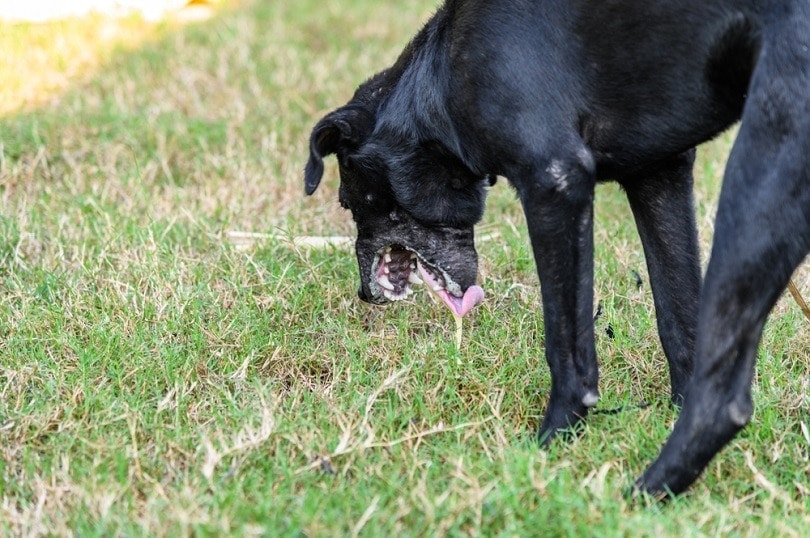Can Dogs Eat Seafood? Vet Reviewed Facts & FAQ

Updated on

Dogs cannot seem to resist the smell of seafood. Whether you are enjoying a plate of sushi, a piece of salmon, or a meal of crab legs, you have probably caught your dog sitting on the sidelines, licking their lips and staring at you intently. Your pooch may have even stolen a piece of fish off your kitchen counter or your dinner plate in the past. So, you may be wondering: Can dogs eat seafood? Is seafood safe for your dog overall?
The answer to this question is essentially yes, in moderation and if prepared appropriately, but there are many precautions you need to take, as well as being aware of risks and dangers before you start treating your furry family member to seafood. There are also certain types of seafood that you should avoid for various reasons. Here is everything that you need to know about feeding seafood to your dog.
The Benefits of Feeding Seafood to Dogs
There are several benefits of feeding seafood to dogs. In fact, many commercial dog foods include seafood in their recipes to ensure complete and balanced nutrition. For starters, seafood is full of healthy omega fatty acids, which are essential for a healthy heart and immune system, among other things.
Fish is also an excellent source of protein, especially for dogs that are allergic to other sources like chicken and beef. It is also low in saturated fat, so it will not contribute to obesity and related health problems like fattier meats can. However, most seafood is fairly rich in another type of fat that is labeled as “healthy fat” in human nutrition: polyunsaturated fats like omega-3. When perfectly cooked, fish is easy on the digestive system and the nutrients can be quickly absorbed into the body. Dogs tend to love the flavor and texture of fish, too.

The Dangers of Feeding Seafood to Dogs
There are a few dangers of feeding seafood to dogs that should not be overlooked. First and foremost, shells and fish bones are a no-no because they are a choking hazard. The bones are fragile and can splint in the stomach or intestines and even puncture the intestines or an organ. Bones can also damage the mouth and throat, while shells may cause teeth fractures, and all can lead to choking.
This could result in the need for an emergency visit to the veterinarian and the possibility of surgery, which is expensive. Another thing to worry about is toxins and heavy metals. Mercury builds up in sea animals and stays inside their tissues. When your pooch eats the fish tissue, they consume the mercury too. Chronic mercury poisoning through seafood can cause digestive problems, but more worrisome is the brain and kidney damage, particularly in puppies and young dogs, and the signs may develop even months later.
Some types of seafood, such as shellfish, can contain a harmful biotoxin that is acquired through filtered feeding, especially during algal blooms. These toxins cannot be deactivated by cooking, and can only be confirmed by laboratory testing. They will lead to neurological signs and paralysis, where the condition gets its name – paralytic shellfish poisoning – and a few cases in dogs have been reported so far.
Another concern is feeding dogs raw fish. Fish that has not been fully cooked can carry bacteria, like Salmonella and Listeria, that can make your pooch ill. Uncooked fish can also transmit any parasites that they are harboring to your dog and cause health issues like an upset stomach, severe case of food poisoning, and lethargy. Also, seafood packed in cans typically contains high levels of salt or other additives that may be harmful. Freshly cooked fish with no added oils or seasonings is always best.
Fish and seafood can also be contaminated with industrial compounds such as polychlorinated phenols or PCBs that may impact human and animal health, but further research is required about the risks associated with these chemicals in dogs.

The Best Types of Seafood for Dogs
There are several types of seafood that your dog is sure to love and that will provide them with nutritional benefits. Salmon and catfish are both great because they tend to harbor less mercury and are lower in saturated fat than many other options. Salmon, on the other hand, is especially rich in polyunsaturated fats, such as omega-3 fatty acids, that may not be appropriate for every dog. Flounder, whitefish, and cod are other options to consider including in your dog’s diet because they are affordable and easy to work with.
Less popular but just as nutritious, both herring and whiting are perfectly suitable for dogs. Sardines and anchovies are so small, they usually collect only small amounts of mercury, making them an excellent treat for dogs of all ages. Your dog can even eat processed seaweed called nori in moderation, to gain some of the same benefits that they would when eating fish.
Consult with your vet about the most appropriate fish choice for your dog, as the recommendations will vary based on their age, medical history, level of activity, and current medication.

The Worst Types of Seafood for Dogs
There are certain types of seafood that your dog should avoid overall, such as larger fish that are known for containing high levels of mercury. Swordfish, shark, and king mackerel are a few examples. Tuna, whether fresh or canned, is also not a good idea because it is well known for being a mercury harbinger. Whenever possible, farmed fish should be avoided because they often contain high levels of the antibiotics and other toxins that they are fed while being raised. These toxins can be passed on to your dog.

Our Final Thoughts
The bottom line is that seafood can be a healthy addition to your dog’s diet, provided that it is fed in moderation, according to your vet’s advice, and after proper preparation practices have been observed. Hopefully, this guide will make choosing the right seafood, properly preparing it, and serving it to your dog a pleasurable experience rather than a stressful one. Do you plan to start serving seafood to your dog occasionally? If so, which options do you think will interest your pooch the most? Leave us a comment below!
See also:
- Can Dogs Eat Flounder? Vet Reviewed Facts & FAQs
- Can Dogs Eat Crab & Crab Meat? Vet-Reviewed Facts and FAQs













